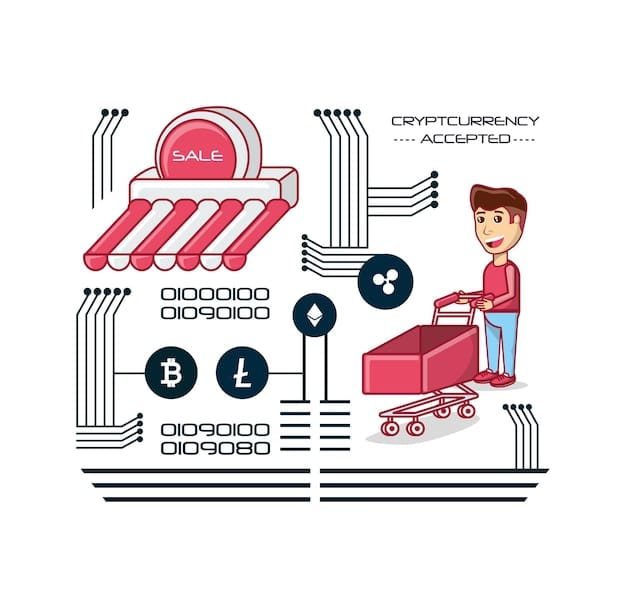Secure US Businesses: Blockchain for Supply Chain & Fraud Reduction

Blockchain technology offers US businesses a robust solution to secure their supply chains and potentially reduce fraud by up to 15% through enhanced transparency, traceability, and immutability.
Is your supply chain vulnerable to fraud and inefficiencies? Discover how US Businesses: Secure Your Supply Chain with Blockchain Technology and Reduce Fraud by 15%, creating a more transparent and trustworthy ecosystem.
Understanding Blockchain Technology for Supply Chain Security
Traditional supply chains are often complex, opaque, and susceptible to fraud. Blockchain technology offers a revolutionary approach to address these challenges by providing a secure, transparent, and immutable ledger for tracking goods and transactions.
At its core, blockchain is a decentralized database that records transactions in blocks, which are then linked together in a chain. Each block contains a cryptographic hash of the previous block, making it virtually impossible to tamper with the data. This inherent security and transparency make blockchain an ideal solution for securing supply chains.
Key Benefits of Blockchain in Supply Chain Management
Implementing blockchain in your supply chain offers a multitude of advantages, from increased efficiency to enhanced security.
- Enhanced Transparency: All participants in the supply chain can access the same information, reducing information asymmetry and fostering trust.
- Improved Traceability: Blockchain allows for end-to-end tracking of goods, enabling businesses to quickly identify the origin and location of products.
- Reduced Fraud: The immutable nature of blockchain makes it difficult for fraudulent activities to occur, as any attempt to alter the data would be immediately detectable.
- Increased Efficiency: By streamlining processes and eliminating intermediaries, blockchain can significantly reduce the time and cost associated with supply chain management.
These benefits contribute to a more resilient and trustworthy supply chain, which is crucial for US businesses operating in today’s global marketplace.

Blockchain technology is not just a theoretical concept; it’s a practical solution that can be implemented across various industries to improve supply chain security and reduce fraud.
The Potential for Fraud Reduction in US Supply Chains
Fraudulent activities in supply chains can take many forms, from counterfeit products to mislabeled goods to theft and diversion. These activities can have significant financial and reputational consequences for US businesses.
Blockchain technology offers a powerful tool to combat these types of fraud by providing a tamper-proof record of all transactions and movements of goods. This enhanced visibility makes it much more difficult for fraudsters to operate undetected.
How Blockchain Can Prevent Specific Types of Fraud
Blockchain can be applied to a wide range of scenarios to mitigate fraud risks in supply chains.
- Counterfeit Products: By tracking the origin and authenticity of goods, blockchain can help consumers verify that they are purchasing genuine products.
- Mislabeled Goods: Blockchain can ensure that products are accurately labeled and described, preventing consumers from being misled.
- Theft and Diversion: Real-time tracking of goods can help businesses identify and prevent theft and diversion, as any unauthorized movement of products would be immediately detectable.
- Data Manipulation: The immutable nature of blockchain prevents data manipulation, ensuring the integrity of supply chain information.
By addressing these common types of fraud, blockchain can help US businesses protect their bottom line and maintain their reputation for quality and integrity.
The potential for fraud reduction is a major driver for US businesses to adopt blockchain technology in their supply chains.
Case Studies: Blockchain Success Stories in Supply Chain
While the adoption of blockchain in supply chain management is still relatively new, there are already several compelling case studies demonstrating its effectiveness.
These real-world examples highlight the tangible benefits of blockchain, from increased transparency to reduced costs to improved security.
Examples of Successful Blockchain Implementations
Let’s examine a few specific examples of how businesses are using blockchain to transform their supply chains.
- Walmart: The retail giant uses blockchain to track the origin and movement of produce, allowing them to quickly identify and remove contaminated products from shelves.
- De Beers: The diamond company uses blockchain to track diamonds from mine to retail, ensuring that they are ethically sourced and conflict-free.
- IBM Food Trust: This blockchain-based platform connects food suppliers, distributors, and retailers, enabling them to share data and improve food safety.
These case studies demonstrate that blockchain is not just a theoretical concept; it’s a practical solution that can deliver real results for businesses of all sizes.

As more businesses adopt blockchain, we can expect to see even more compelling case studies emerge, further solidifying its role as a key technology for supply chain management.
Implementing Blockchain: A Step-by-Step Guide for US Businesses
Implementing blockchain in your supply chain can seem daunting, but by following a structured approach, you can successfully integrate this technology into your operations.
This step-by-step guide will help you navigate the process, from identifying your specific needs to selecting the right blockchain platform.
Key Steps for Blockchain Implementation
Here’s a breakdown of the key steps involved in implementing blockchain in your supply chain:
- Identify Your Needs: Determine which areas of your supply chain would benefit most from blockchain technology.
- Choose a Blockchain Platform: Select a blockchain platform that meets your specific requirements, considering factors such as scalability, security, and cost.
- Develop a Proof of Concept: Create a small-scale implementation of blockchain to test its feasibility and identify any potential challenges.
- Integrate with Existing Systems: Integrate your blockchain platform with your existing supply chain management systems.
- Train Your Team: Provide your team with the training they need to effectively use and manage the blockchain platform.
By following these steps, you can ensure a smooth and successful implementation of blockchain in your supply chain, maximizing its benefits for your business.
It’s important to remember that blockchain implementation is an ongoing process that requires continuous monitoring and optimization.
The Return on Investment (ROI) of Blockchain in Supply Chain
While the initial investment in blockchain technology may seem significant, the potential return on investment (ROI) can be substantial.
By reducing fraud, increasing efficiency, and improving transparency, blockchain can deliver significant cost savings and revenue gains for US businesses.
Calculating the ROI of Blockchain
The ROI of blockchain can be calculated by comparing the costs associated with implementation to the benefits gained.
Some of the key benefits to consider include:
- Reduced Fraud Losses: Blockchain can help prevent fraud, resulting in significant cost savings.
- Increased Efficiency: Streamlined processes and reduced intermediaries can lead to lower operating costs.
- Improved Transparency: Enhanced visibility can help businesses make better decisions and optimize their supply chains.
- Enhanced Brand Reputation: Demonstrating a commitment to ethical and transparent supply chains can enhance brand reputation and attract customers.
By quantifying these benefits and comparing them to the costs of implementation, you can determine the potential ROI of blockchain for your business.
Many businesses find that the ROI of blockchain is well worth the investment, particularly in industries where fraud and inefficiency are prevalent.
Addressing the Challenges of Blockchain Adoption
Despite its many benefits, blockchain adoption also presents several challenges that US businesses must address.
These challenges include technical complexities, regulatory uncertainty, and a lack of standardization.
Overcoming the Obstacles to Blockchain Adoption
Here are some strategies for addressing the challenges of blockchain adoption:
- Partner with Experts: Work with experienced blockchain consultants and developers to navigate the technical complexities.
- Stay Informed About Regulations: Keep abreast of the latest regulatory developments related to blockchain technology.
- Embrace Standardization: Support industry efforts to develop standards for blockchain interoperability and data sharing.
By proactively addressing these challenges, US businesses can increase their chances of successfully adopting blockchain and reaping its many benefits.
It’s important to remember that blockchain is still an evolving technology, and ongoing learning and adaptation are essential for success.
| Key Point | Brief Description |
|---|---|
| 🛡️ Security | Blockchain enhances data integrity and reduces fraud. |
| 🚀 Efficiency | Streamlines supply chain processes, cutting costs & time. |
| 📊 Transparency | Offers a clear view of product journey, building trust. |
| 📈 ROI | Potential cost savings and revenue gains from blockchain. |
Frequently Asked Questions (FAQ)
▼
Blockchain is a decentralized, distributed, and immutable ledger that records transactions across many computers. This makes it secure and transparent.
▼
Blockchain enhances traceability, transparency, and security by providing a shared, tamper-proof record of all transactions along the supply chain.
▼
Blockchain can prevent counterfeit goods, mislabeled products, theft, and data manipulation, all thanks to its transparent and immutable features.
▼
Challenges include technical complexities, regulatory uncertainty, lack of standardization, and the need for collaboration among supply chain partners.
▼
ROI comes from reduced fraud losses, increased efficiency, improved transparency, and enhanced brand reputation. These benefits can lead to significant savings.
Conclusion
For US Businesses: Secure Your Supply Chain with Blockchain Technology and Reduce Fraud by 15% represents a paradigm shift in supply chain management. By embracing this technology, companies can build more secure, transparent, and efficient ecosystems, ultimately fostering greater trust and resilience in the face of evolving global challenges.





